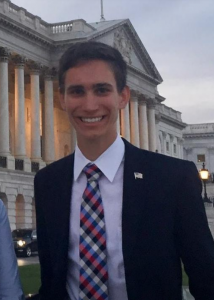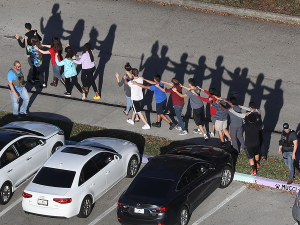On February 14, murder suspect Nikolas Cruz entered Marjory Stoneman Douglas High School and killed 17 students and faculty with an AR-15 semi-automatic style weapon. The 19-year-old shooter had purchased his gun legally, despite community members making multiple calls to police to express worries that Cruz could become violent prior to the shooting.
WUVA News sat down with Mary Alice Kukoski, the president of University Democrats, and Adam Kimelman, the chairman of College Republicans, to discuss gun reform following the Parkland, Fl., tragedy.

Both students had similar first thoughts after hearing about the shooting.
Kukoski explained, “I feel like its become – I don’t want to say normal – but in a way it has. It seems like almost every week we hear about another shooting, and there’s no action by legislature.”
Kimelman also noted the growing normality of shootings.

“My first thoughts were that a shooting like this has happened again, and it is incredibly sad once again… This deranged individual was able to pass a background check, like many other people who have committed mass shootings before. That clearly shows that there is something flawed with that system,” the CR chairman remarked.
Kimelman hopes that in the future we are able to “make sure that people are actually inputting the information in the background system, so that it’s more effective.”
While many Democratic politicians have been at the forefront of gun reform debate, Kimelman pointed out that recently there has been a push for Republicans to reform gun laws.
“Under this president we’ve been seeing that Republicans are more active to do something about gun control than they’ve been in the past,” he said.
In addition to espousing stricter background checks, Kukoski advocated for “common sense gun reform.”
“Banning bump stocks would be a good start,” she said. “I think I’ve heard some bipartisan solutions to that possibly, so I think that could be helpful.”

Kimelman also supported potentially banning bump stocks, as well as boosting mental health and heightening background checks.
“I think [mental health reform] is something that could potentially fold into the healthcare debate … I think the biggest thing we can do, besides increase mental health, is increase the background check system,” Kimelman explained.
The two did differ, at least on a personal level, about whether it is beneficial to society for private citizens to own guns.
Kukoski explained, “As the person who I am, I don’t think so… We’re not going to stop any more gun violence by arming all citizens.”
However, Kukoski continued, putting her views in the larger context of the gun debate.
“I think gun control isn’t about taking away people’s guns, but implementing smart solutions, background checks, and classes so people are smart about using them,” she said. “I think the correct solution is going through proper channels and making those reforms so it’s safer for everyone.”
While Kimelman supported stronger background checks to prevent the mentally ill from getting guns, he explained his view that the right to bear arms is necessary to American democracy.
“Trying to limit the amount of weapons that every individual can have, I think, is a massive violation of not only the second amendment but of individual’s right to be able to protect themselves…” Kimelman explained. “A lot of people say the president’s too authoritarian…. Do you really want him to be the only person who’s able to have weapons?”
He disagreed that the reason the U.S. has more gun violence than other countries is due to easier accessibility to guns.
“In U.S. we’ve seen number of mass shootings rise as the number of guns per person has fallen,” Kimelman stated.
Both Kimelman and Kukoski agreed that Trump’s proposal to arm teachers and offer financial incentives for gun-carrying in schools is not the right solution.
For Kukoski, this plan “inherently goes against everything I’ve ever thought. I think the classroom environment is supposed to be a safe place, and I think that by introducing guns and other weapons to it, is just isn’t anymore. I don’t think that’s the direction we should be moving in… what’s to say in the moment that [the teacher] would even have a chance to grab a gun, or that a child would get hold of it?”
Kimelman echoed Kukoski’s sentiments, stating that
“I understand why [Trump] wants to do that, but I don’t think that arming teachers is the best move. It’s not because I don’t trust teachers, but because it poses a practical issue of, if there’s an armed shooter situation in a school, and the police who comes into the building sees an adult with a gun, they’re most likely to shoot that person first and ask questions later,” he said.
On March 14, there will be a walkout at UVa to protest gun violence. To Kukoski, this walkout represents the start of a powerful shift in student sentiment toward communicating with their representatives about gun safety.
Kukoski explained, “I think its sending a message to legislatures that we are students and we want to see this change… I think this is the start of something, and it’s really heartening to see so many students getting involved in the process.”
In regards to the walkout, Kimelman stated, “it shows that, first of all, students are being more politically active, and that’s a good thing. Students want something to change, and that’s also a good thing. So I think that though we might not agree with 100% of they’re marching for, it’s good that they’re marching as a whole.”















